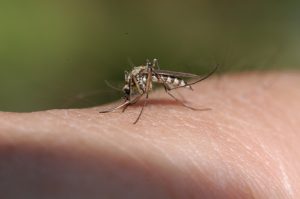 Zika virus and malaria are both mosquito-borne illnesses, and since the rise of Zika first in Brazil and now overseas, many are questioning the similarities and differences between malaria and Zika virus.
Zika virus and malaria are both mosquito-borne illnesses, and since the rise of Zika first in Brazil and now overseas, many are questioning the similarities and differences between malaria and Zika virus.
Zika is becoming a growing problem, as it’s not only affecting the Brazil population, but sending worldwide researchers and scientists into frenzy to better understand the virus and develop proper treatments and potentially a cure.
Advertisement
Malaria, on the other hand, has been residing in Africa for decades, and there are effective treatment methods available to address the illness.
Although both Zika virus and malaria are transmitted through mosquitoes, the two illnesses still have their respective differences, which is important to understand. Here is a breakdown of the similarities and differences when it comes to Zika virus and malaria.
Comparison table: Zika vs Malaria
| Zika Virus | Malaria | |
|---|---|---|
| Mosquito type | Aedes mosquitoes | Anopheles mosquitoes |
| Caused by | Virus: Belongs to Flaviviridae family and the genus Flavivirus | Micro-organisms: Plasmodium parasites |
| Sexual transmission | Possible | Not possible |
| Peak biting hours | Daytime | Dusk, Nighttime and Dawn |
| Areas affected | Mexico, Central America, South America Sporadic transmission Caribbean islands, Southeast Asia, Oceania | Mexico, Central America, South America, Caribbean Islands, Sub-Saharan Africa, Asia Sporadic transmission Middle East, North America |
| U.S. citizens travelling to affected areas | 11 million | 27 million |
| Risk groups | Pregnant women, travelers | Young children, pregnant women and non-immune travelers |
| Global widespread transmission | 41 countries and territories | 93 countries and territories |
| Cases reported in the U.S. | 388 | 1,500–2,000 approx. every year |
| Effect on pregnancy |
|
|
| Symptoms |
|
|
| Treatment | No treatment yet | Artemisinin-based combination therapy (ACT) for P. falciparum malaria |
| Prevention |
|
|
Difference between Zika vs Malaria. Download comparison chart (JPG)
Zika vs. Malaria: causes, symptoms, and diagnosis
Zika is caused by a bite from the Aedes mosquito and malaria is transmitted through the Anopheles mosquito, though it can be contracted from a parasite, too.
Common symptoms of Zika virus include fever, rash, joint pain, and red eyes, but many individuals won’t even know they have Zika as they can remain symptomless for quite some time. Other symptoms of Zika virus may include headache and muscle pain, but these symptoms will not appear immediately and may actually take weeks to show.
For pregnant women, symptoms may appear within two weeks of travel to a Zika virus country. Because symptoms can overlap with other health problems, it’s important to tell your doctor that you have travelled, so they can narrow in on their diagnosis.
Malaria symptoms can be similar to the flu – which can delay diagnosis. Symptoms include fever, headache, overall aches and pains, nausea and vomiting, diarrhea, and abdominal cramping. Malaria in children may include high fever, cough, and rapid breathing. More intense symptoms of malaria include swollen liver or spleen, which can be palpable and can intensify quite quickly – even leading to death.
Malaria symptoms may not appear right away and, in fact, may present themselves weeks, months, or even years after you have travelled to a country with malaria. This depends on which variation of malaria you have contracted and the species of mosquito.
Diagnosing Zika virus can be difficult, as it closely resembles dengue and chikunguya, which are transmitted by the same mosquito. Your doctor will run blood work to determine which virus you have.
Malaria can be life-threatening, so early diagnosis is essential. Diagnosis of malaria consists of signs and symptoms, and is confirmed through blood testing analysis.
Zika vs. Malaria: in pregnancy
 Both Zika virus and malaria are particularly harmful to pregnant women. The information that is available regarding pregnant women and Zika virus is still quite limited, and additional research is required in order to better understand the complications associated with pregnancy and the virus.
Both Zika virus and malaria are particularly harmful to pregnant women. The information that is available regarding pregnant women and Zika virus is still quite limited, and additional research is required in order to better understand the complications associated with pregnancy and the virus.
So far we know that pregnant women can contract Zika either by a mosquito bite or through sexual intercourse with a male who has the virus. Zika can then be passed on to the fetus either during pregnancy or delivery.
What is not fully understood is the effect of Zika on the fetus or newborn. So far, Zika virus has been linked to microcephaly, which is a birth defect in which the babies are born with exceptionally small heads. Although evidence is growing to link Zika virus to microcephaly, researchers are still unaware if microcephaly is a result of Zika during pregnancy.
Other effects Zika virus has been associated with during pregnancy are absent or poorly developed brain structures, eye defects, hearing deficit, and impaired growth. Even still, these are only preliminary findings, and there is still a large need for more research to confirm such links.
Malaria during pregnancy can result in low birth weight of the child as a result of Plasmodium falciparum infection, and occurs predominantly in Africa. In high transmission P. falciparum may not present symptoms, but parasites may be present in the placenta and can cause anemia in the mother This is what contributes to low birth weight, which increases the risk of child mortality.
Malaria infections caused by P. vivax and P. falciparum can result in chronic anemia and placental malarial infection. It has been found that the risks associated with R. vivax reduce with successive pregnancies, while the largest risk comes with the first pregnancy.
Zika vs. Malaria: prevention and treatment
There is currently no preventative vaccination available for Zika virus, so the best way to avoid contracting Zika is by preventing mosquito bites.
Mosquito bite prevention tips include:
- Wear long sleeves and long pants.
- Stay in air-conditioned places and ensure screens are used to prevent mosquitoes from entering the home.
- If you are travelling, sleep under a mosquito net.
- Use insect repellant, carefully follow the instructions, and ensure you reapply.
- Treat clothing or gear with permethrin or purchase permethrin-treated items.
- Avoid areas with still water where mosquitoes can easily breed.
Malaria prevention uses the same mosquito-prevention tips.
There is currently no treatment for Zika virus, so avoiding the mosquito bites is your best bet for now – along with steering clear of unnecessary travel to Zika-ridden countries.
There are treatment options available for malaria known as anti-malarial drugs, but if malaria is not treated, it can lead to vast health complications.
What happens if Malaria is not treated?
 When you are infected with malaria, the parasites enter your blood stream and start infecting your liver cells. The reproduction of parasites in liver cells causes them to burst open allowing for additional parasites to enter the bloodstream and infect red blood cells.
When you are infected with malaria, the parasites enter your blood stream and start infecting your liver cells. The reproduction of parasites in liver cells causes them to burst open allowing for additional parasites to enter the bloodstream and infect red blood cells.
Further reproduction of parasites occurs in the red blood cells and continues to grow from there.
If left untreated, malaria can ultimately lead to death and is more threatening to pregnant women and their fetus. For this reason, pregnant women are strictly advised against traveling to countries with malaria.
Furthermore, if malaria is left untreated, it can be recurring and even last for years..
Also, read Bel Marra Health’s article on Zika virus vs Dengue.
Related Reading:
Zika virus outbreak 2016, mosquito bites, insecticides, and more
The Zika virus is spread through mosquito bites, and insecticides can help reduce your risk of getting bitten. The Zika virus originated in Brazil and is quickly becoming a global problem with many countries now being labeled as dangerous for travel, especially for pregnant women. Continue reading…
Advertisement
Experts predict Zika will travel to southern U.S.
Experts predict that Zika – a mosquito-borne virus – will travel to the Southern U.S. Although experts are not sure when the virus may spread, they are certain that it is only a matter of time that the birth-defect illness will make its way into America. Continue reading…
Sources:
http://www.politicswithstyle.com/zika-virus-vs-malaria/
http://www.who.int/mediacentre/factsheets/fs094/en/
http://www.cdc.gov/zika/symptoms/index.html
http://www.who.int/malaria/areas/high_risk_groups/pregnancy/en/
http://www.cdc.gov/zika/prevention/
http://www.who.int/mediacentre/factsheets/fs094/en/
http://www.nytimes.com/interactive/2016/health/what-is-zika-virus.html?_r=2
https://www.cdc.gov/zika/pregnancy/index.html
